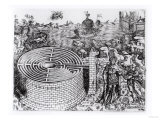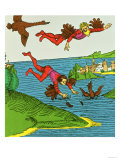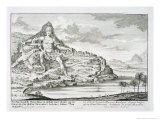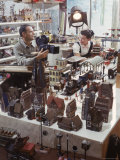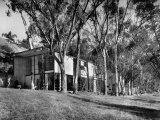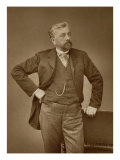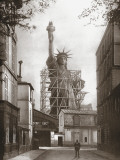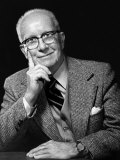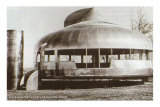|
|
|
|
Daedalus
Daedalus, or “Cunning Worker”, from Greek mythology, is mentioned by both Homer and Ovid as creating the labyrinth to keep the Minotaur. A strict definition of a labyrinth is a “structures with a single-path ... to the center ... an unambiguous through-route to the center and back ... not designed to be difficult to navigate”, as opposed to a maze, that was meant to confuse.
Daedalus most cunning work may have been wings he created so he and his young son Icarus could escape from King Minos who had imprisoned them to prevent the secret of the labyrinth leaving Crete.
FYI - James Joyce chose the name Stephen Dedalus for his major character suggesting that he could “fly” above the constraints of culture and society.
|
|
|
|
Dinocrates
fl last quarter 4th century BC; Greece
Dinocrates of Rhodes, architect and technical adviser to Alexander the Great, is known for planning the city of Alexandria, among other structures.
The Colossus of Mount Athos was in his first plans for a city glorifying Alexander. Alexander rejected the Mount Athos as an inhospitable site.
|
|
|
|
Charles & Ray Eames
Charles Eames (b. 6-17-1907, St. Louis, MO; d. 8-21-1978) and his wife Ray (b. 12-15-1912, Sacramento, CA; d. 8-21-1988) produced industrial, furniture and graphic design, art, film and architecture iconic of the 20th century.
The Eames House was a Case Study project to “design and build inexpensive and efficient model homes” that could be reproduced to allievated the housing shortage brought about by returning soldiers after World War II.
The Eames also produced the short film “The Powers of Ten”, which was inspired by Kees Boeke's 1957 essay/book Cosmic View.
|
|
|
|
Alexandre Gustave Eiffel
b. 12-15-1832; Dijon, France
d. 12-27-1923; Paris
Eiffel, a French structural engineer and architect specializing in metal structures, is most remembered for designing the Eiffel Tower (built for the 1889 Universal Exposition in Paris). • world tree
Eiffel also designed the armature for sculptor Frederic Bartholdi's Statue of Liberty in New York.
Another of Eiffel's designs, one for a wine tasting rotunda at the Exposition Universalle 1900, is now known as La Ruche (the beehive), a building that was dismantled and relocated to Montparnesse as low cost artist's residence and studio space that flourished until World War II.
• Eiffel: The Genius Who Reinvented Himself
|
|
|
|
|
|
|
R. Buckminster Fuller
b. 7-12-1895; Milton, Massachusetts
d. 7-1-1983; Los Angeles
Bucky Fuller was an American architect, author, designer, futurist, inventor, poet and visionary.
Fuller was primarily concerned with the question “Does humanity have a chance to survive lastingly and successfully on planet Earth, and if so, how?” Further he wanted to know how an average individual without special monetary means or academic degree, could do to improve humanity's condition that large organizations, governments, or private business could not do.
Buckminster Fuller was the great nephew of feminist and author Margaret Fuller, developed the geodesic dome (geodesics are a network of great circles lying approximately on the surface of a sphere), designed the Dymaxion House, attended a Froebelian kindergarten, and has the fullerene, a carbon molecule, named for him.
“All children are born geniuses. 9999 out of every 10,000 are swiftly, inadvertently, degeniused by grown-ups. This happens because human beings are born naked, helpless, and though superbly equipped cerebrally, utterly lacking in experience, therefore utterly ignorant. Their delicate sensing equipment is, as yet, untried. Born with build-in hunger, thirst, curiosity, the procreative urge, they can only learn what humanity has learned by trial and error, by billions and billions of errors. Yet humanity is also endowed with self-deceiving pride. All those witnessing the errors of others proclaim that they (the witnesses) could have prevented those errors had they only been consulted. “People should not make mistakes” they mistakenly say. Motivated entirely by love, but also by fear for the futures of the children they love, parents, in their ignorance, act as though they know all the answers and curtail the spontaneous exploratory acts of their children lest the children make “mistakes”. But genius does its own thinking; it has confidence in its own exploratory findings, in its own intuitions, in the knowledge gained from its own mistakes. Nature has her own gestation rates for evolutionary development.
The actions of parents represent the checks and balances of nature's gestation control. Humanity can evolve healthily only at a given rate. Maria Montessori was fortunately permitted to maintain, sustain, and cultivate her innate genius. Her genius invoked her awareness of the genius inherent in all children. Her intuition and initiative inspired her to discover ways of safeguarding this genius while allaying fears of parents. But the way was not always easy. Hers was the difficult frontiering task of genius.”
Buckminster Fuller
• Critial Path by R. Buckminster Fuller
• Fuller Projection Global Map - Our Spaceship Earth
• ecology posters
• H.S.M. Coxeter, geometer
|
|
|
previous page | top | next
architecture | architects list | a | b | c | D-E-F
| g | h | i-j | k-l | m | n | o-p | r | s | t-v | w-x-y-z
|
|
I have searched the web for visual, text, and manipulative curriculum support materials - teaching posters, art prints, maps, charts, calendars, books and educational toys featuring famous people, places and events - to help teachers optimize their valuable time and budget.
Browsing the subject areas at NetPosterWorks.com is a learning experience where educators can plan context rich environments while comparing prices, special discounts, framing options and shipping from educational resources.
Thank you for starting your search for inspirational, motivational, and educational posters and learning materials at NetPosterWorks.com. If you need help please contact us.
|
|
|











